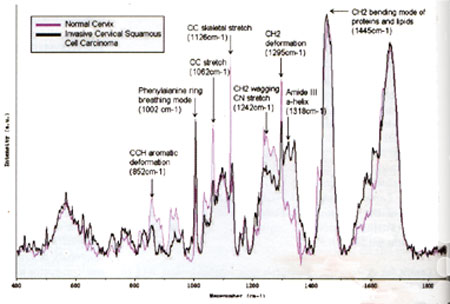| 2003 |

|
YEAR BOOK |
Dublin Institute of Technology
|
Cervical Cancer Research
|

Scientists at DIT are developing a spectroscopic technique that has the potential to remove human interpretation. These researchers at DIT's Facility for Optical Characterisation and Spectroscopy (FOCAS) are working in collaboration with the National Maternity Hospital, Holles Street, to investigate the use of Raman spectroscopy as a novel screening method for cervical cancer. Raman spectroscopy is an analytical, non-destructive technique that provides information about the molecular structure of the investigated sample. The molecular structures of DNA, proteins and lipids differ between normal and tumour tissues and therefore Raman spectroscopy, which probes these structures, offers promise for the diagnosis of cancer.
At DIT, Raman spectra from normal and tumour cervical tissue have been obtained. Bands have been attributed to C=O stretching modes and NH bending modes of proteins; C-C, C-N, C=C stretching modes and C-N and -NH2 bending modes of nucleic acid bases; and C-H stretching modes and CH2 symmetric and asymmetric C-H stretching vibrations of lipids and biomembranes. Significant differences in the relative intensities, position, and width of these bands have been observed in the spectra from normal and tumour tissue (see figure).
Early work has shown that the technique can identify spectral differences between normal and tumour tissue. The ultimate goal of the work is to screen cervical smear samples in order to identify early changes.
Contact: Dr Fiona Lyng; Tel: 01-402 2818; Fax: 01-402 4999; E-mail: [email protected]